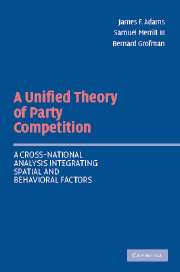Crossref Citations
This Book has been
cited by the following publications. This list is generated based on data provided by Crossref.
Grofman, Bernard
2004.
DOWNS AND TWO-PARTY CONVERGENCE.
Annual Review of Political Science,
Vol. 7,
Issue. 1,
p.
25.
EZROW, LAWRENCE
2005.
Are moderate parties rewarded in multiparty systems? A pooled analysis of Western European elections, 1984–1998.
European Journal of Political Research,
Vol. 44,
Issue. 6,
p.
881.
Martin, Christian W.
and
Plümper, Thomas
2005.
Number of Parties, Endogenous Partisan Preferences, and Electoral Turnout Rates.
Social Science Computer Review,
Vol. 23,
Issue. 3,
p.
347.
ADAMS, JAMES
and
MERRILL, SAMUEL
2006.
Why Small, Centrist Third Parties Motivate Policy Divergence by Major Parties.
American Political Science Review,
Vol. 100,
Issue. 3,
p.
403.
Shikano, Susumu
2006.
Jahrbuch für Handlungs- und Entscheidungstheorie.
p.
47.
Adams, James
Clark, Michael
Ezrow, Lawrence
and
Glasgow, Garrett
2006.
Are Niche Parties Fundamentally Different from Mainstream Parties? The Causes and the Electoral Consequences of Western European Parties' Policy Shifts, 1976–1998.
American Journal of Political Science,
Vol. 50,
Issue. 3,
p.
513.
Yamamoto, Koji
2006.
How Political Parties Follow the Partisanss Preferences: Simulation Based on Statistical Estimates of Japanese Voting Behavior.
SSRN Electronic Journal,
Adams, James
Dow, Jay
and
Merrill, Samuel
2006.
The political consequences of alienation-based and indifference-based voter abstention: Applications to Presidential Elections.
Political Behavior,
Vol. 28,
Issue. 1,
p.
65.
Tavits, Margit
2007.
Principle vs. Pragmatism: Policy Shifts and Political Competition.
American Journal of Political Science,
Vol. 51,
Issue. 1,
p.
151.
Kitschelt, Herbert
2007.
Growth and Persistence of the Radical Right in Postindustrial Democracies: Advances and Challenges in Comparative Research.
West European Politics,
Vol. 30,
Issue. 5,
p.
1176.
Debus, Marc
2007.
Bestimmungsfaktoren des Wahlverhaltens in Deutschland bei den Bundestagswahlen 1987, 1998 und 2002: Eine Anwendung des Modells von Adams, Merrill und Grofman.
Politische Vierteljahresschrift,
Vol. 48,
Issue. 2,
p.
269.
Merrill, Samuel
and
Adams, James
2007.
The effects of alternative power-sharing arrangements: Do “moderating” institutions moderate party strategies and government policy outputs?.
Public Choice,
Vol. 131,
Issue. 3-4,
p.
413.
Grofman, Bernard
2007.
toward a science of politics?.
European Political Science,
Vol. 6,
Issue. 2,
p.
143.
Sanders, David
Clarke, Harold D.
Stewart, Marianne C.
and
Whiteley, Paul
2007.
Does Mode Matter For Modeling Political Choice? Evidence From the 2005 British Election Study.
Political Analysis,
Vol. 15,
Issue. 3,
p.
257.
Macdonald, Stuart Elaine
Rabinowitz, George
and
Listhaug, Ola
2007.
Simulating Models of Issue Voting.
Political Analysis,
Vol. 15,
Issue. 4,
p.
406.
Levine, Renan
2007.
Sources of Bias in Voter Expectations under Proportional Representation.
Journal of Elections, Public Opinion & Parties,
Vol. 17,
Issue. 3,
p.
215.
Grofman, Bernard
2008.
Readings in Public Choice and Constitutional Political Economy.
p.
91.
HELLWIG, TIMOTHY
2008.
Explaining the salience of left–right ideology in postindustrial democracies: The role of structural economic change.
European Journal of Political Research,
Vol. 47,
Issue. 6,
p.
687.
Sanders, David
Clarke, Harold D.
Stewart, Marianne C.
and
Whiteley, Paul
2008.
The Endogeneity of Preferences in Spatial Models: Evidence from the 2005 British Election Study.
Journal of Elections, Public Opinion and Parties,
Vol. 18,
Issue. 4,
p.
413.
De Sio, Lorenzo
2008.
Are Less-Involved Voters the Key to Win Elections?.
Comparative Political Studies,
Vol. 41,
Issue. 2,
p.
217.



